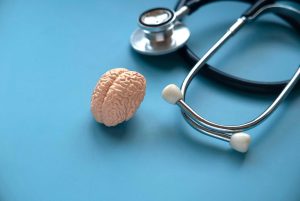Marijuana for Alzheimer’s Disease
- John DiBella
- Published: October 3, 2024
- Fact-checked by Dr. Desiree Granados

Alzheimer’s disease is a complex neurodegenerative condition that progressively impacts memory, thinking, and behavior. As traditional treatments primarily focus on managing symptoms rather than curing the disease, many patients and their caregivers are exploring alternative therapies like medical marijuana. With increasing research, there is growing interest in whether cannabis might help alleviate symptoms associated with Alzheimer’s.
Does Marijuana Help With Alzheimer’s Disease?
Yes, marijuana has been shown to potentially help manage some of the symptoms associated with Alzheimer’s disease. While cannabis does not cure or stop the progression of the disease, research suggests that its components, particularly cannabinoids like THC and CBD, may help with symptom relief.
The potential benefits of marijuana for Alzheimer’s come from its interaction with the endocannabinoid system, which regulates functions like mood, memory, and pain. Some studies have indicated that cannabinoids may reduce inflammation in the brain, decrease the buildup of harmful amyloid plaques, and alleviate behavioral symptoms such as aggression, anxiety, and insomnia.
Additionally, cannabis has neuroprotective properties, which may offer some protective effects against cognitive decline. However, more research is needed to fully understand the efficacy and safety of medical marijuana for Alzheimer’s disease.
What Is Alzheimer’s Disease and What Are Its Symptoms?
Alzheimer’s disease is the most common form of dementia, a general term for memory loss and other cognitive abilities that interfere with daily life. It affects over six million Americans, and its impact continues to grow as the population ages. The condition is caused by the buildup of abnormal proteins in the brain, leading to the loss of neurons and their connections.
Symptoms of Alzheimer’s typically develop slowly and worsen over time. Early signs include memory lapses, difficulty concentrating, and confusion about time or place. As the disease progresses, individuals may experience mood swings, difficulty speaking, and significant cognitive decline, eventually requiring full-time care. Traditional treatments, such as cholinesterase inhibitors and memantine, aim to manage symptoms but do not stop the disease’s progression.

Can You Get a Medical Marijuana Card for Alzheimer’s Disease?
Yes, you can get a medical marijuana card for Alzheimer’s disease in several states where the condition is a qualifying medical issue for cannabis treatment. As medical marijuana programs vary by state, it’s important to check the specific requirements in your area.
There are currently 19 states where Alzheimer’s disease is a qualifying condition for medical marijuana. In other states, approval may depend on a doctor’s recommendation. For example, some states may not list Alzheimer’s disease directly, but doctors can still authorize medical marijuana if they believe it will benefit the patient. Check out our interactive map to learn more about medical marijuana in your state: “Marijuana Laws by State”
Additionally, Lewy Body Disease, another form of dementia related to Alzheimer’s, may also qualify for medical marijuana in some states. It affects cognitive function, movement, and behavior, often causing symptoms like agitation and hallucinations. Like Alzheimer’s, medical marijuana might help with symptoms such as anxiety and sleep issues. The process for obtaining a card for Lewy Body Disease is similar, with regulations varying by state.
If you’re in a state where Alzheimer’s is a qualifying condition, you can obtain a medical marijuana card through The Sanctuary Wellness Institute, which operates in several states. One of our medical marijuana doctors can evaluate whether cannabis may help alleviate your symptoms.
How to Use Marijuana for Alzheimer’s Disease
There are various methods of using marijuana for Alzheimer’s disease, and the best approach will depend on individual preferences and needs. For people with Alzheimer’s, smoking might not be ideal due to potential respiratory issues, so other options may be more suitable.
- Oils and tinctures: These provide precise dosing and can be taken sublingually (under the tongue), offering rapid effects without the need to smoke.
- Edibles: Gummies and other edible forms offer a discreet and easy-to-dose method, though their effects may take longer to set in compared to other methods.
- Topical creams: For patients experiencing localized pain or discomfort, applying cannabis-infused creams or balms can help target those areas without introducing psychoactive effects.
The Sanctuary recommends consulting with a medical marijuana doctor to determine the best method and dosage for your specific situation.
What Are the Best Marijuana Strains for Alzheimer’s Disease?
Different strains of marijuana may offer unique benefits for individuals with Alzheimer’s, depending on the symptoms they’re experiencing. For example, some strains may help manage anxiety, while others might be better suited for promoting sleep or reducing pain. Here are a few strains that may be beneficial:
- ACDC: This strain is known for its high CBD and low THC content, making it ideal for beginners or patients who want symptom relief without feeling “high.” It’s often used to reduce anxiety and inflammation.
- Granddaddy Purple: An indica strain that may help with insomnia and restlessness, Granddaddy Purple is known for its calming effects, making it useful for those struggling with sleep disturbances.
- Harlequin: Another high-CBD strain, Harlequin is known for its ability to alleviate pain and anxiety without causing significant psychoactive effects, which is beneficial for elderly patients.
- Sour Diesel: Known for its energizing and uplifting effects, Sour Diesel may help with agitation and mood swings, making it useful for managing the behavioral symptoms often associated with Alzheimer’s disease.
It’s important to consult a doctor or cannabis expert to find the strain that best addresses your individual symptoms.
What Are the Potential Risks and Side Effects of Using Cannabis for Alzheimer’s Disease?
While cannabis can offer relief for some symptoms of Alzheimer’s disease, it’s important to understand the potential risks and side effects. Common side effects of cannabis use may include dizziness, dry mouth, and changes in appetite. For patients with Alzheimer’s, the risk of confusion or disorientation could potentially be exacerbated by the psychoactive effects of THC.
However, adverse effects are often minimal when following a doctor’s recommended dosage. Patients should start with low doses, particularly if they are new to cannabis, to minimize any unwanted side effects. Consulting with a medical marijuana professional is key to tailoring treatment to an individual’s needs and condition.
Conclusion
While medical marijuana does not cure Alzheimer’s disease, it may help manage symptoms like agitation, anxiety, insomnia, and pain, offering patients and caregivers a potential alternative or supplement to traditional treatments. The Sanctuary Wellness Institute can guide you through the process of obtaining a medical marijuana card and provide advice on how to incorporate cannabis into your treatment plan.
To learn more about getting a medical marijuana card for Alzheimer’s disease, contact The Sanctuary today.
States Where We Offer Medical Marijuana Card Services
How we reviewed this article:
- Mayo Clinic (2024). Alzheimer’s disease
https://www.mayoclinic.org/diseases-conditions/alzheimers-disease/symptoms-causes/syc-20350447 - Antonio Currais, Oswald Quehenberger, Aaron M Armando, Daniel Daugherty, Pam Maher & David Schubert (2016) CANNABINOIDS REMOVE PLAQUE-FORMING ALZHEIMER’S PROTEINS FROM BRAIN CELLS
https://www.salk.edu/news-release/cannabinoids-remove-plaque-forming-alzheimers-proteins-from-brain-cells/ - Alzheimer’s Society (2024). Cannabis, CBD oil and dementia
https://www.alzheimers.org.uk/about-dementia/treatments/alternative-therapies/cannabis-cbd-oil-and-dementia - Zhibin Liang, David Soriano-Castell , Devin Kepchia, Brendan M Duggan, Antonio Currais, David Schubert and Pamela Maher (2022). ACTIVE INGREDIENT IN CANNABIS PROTECTS AGING BRAIN CELLS
https://www.salk.edu/news-release/active-ingredient-in-cannabis-protects-aging-brain-cells/ - Cleveland Clinic (2022). Alzheimer’s Disease
https://my.clevelandclinic.org/health/diseases/9164-alzheimers-disease - Susan Bernstein and Julie Marks (2024). What Is Lewy Body Dementia?
https://www.webmd.com/alzheimers/dementia-lewy-bodies - Agnieszka Wrzesień, Kryspin Andrzejewski, Monika Jampolska, and Katarzyna Kaczyńska (2024). Respiratory Dysfunction in Alzheimer’s Disease—Consequence or Underlying Cause? Applying Animal Models to the Study of Respiratory Malfunctions
https://www.ncbi.nlm.nih.gov/pmc/articles/PMC10888758/ - Leafly (2024). Sour Diesel
https://www.leafly.com/strains/sour-diesel - Harvard Health (2021). The effects of marijuana on your memory
https://www.health.harvard.edu/mind-and-mood/the-effects-of-marijuana-on-your-memory
Current Version
October 3, 2024
Written By
John DiBella
Fact-checked By
Dr. Desiree Granados
Editorial Process
Our Editorial Process
Other Posts About Medical Marijuana Treatment

John DiBella is the co-founder and CEO at The Sanctuary Wellness Institute. His goal is to foster healthier lifestyles to improve individuals’ quality of life and health span through online medical and non-medical services. When he’s not writing health & wellness articles for The Sanctuary, he enjoys hiking, camping, surfing and sailing.







